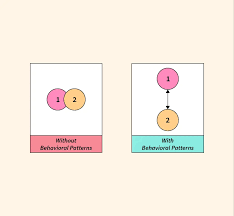Behavioral patterns are the habits and routines that we develop over time. They can be positive or negative and can have a significant impact on our lives. Understanding our behavioral patterns is essential for personal growth and development.
Positive behavioral patterns include habits such as exercise, healthy eating, and good sleep hygiene. These behaviors contribute to overall well-being and can improve physical health, mental clarity, and emotional stability. Positive behavioral patterns also help us achieve our goals by providing structure, discipline, and motivation.
Negative behavioral patterns can be more challenging to identify and overcome. These behaviors may include addiction, procrastination, self-sabotage, or negative self-talk. Negative behavioral patterns often result from deep-seated beliefs or past experiences that have not been resolved.
One effective way to break negative behavioral patterns is through coaching. Coaching provides a safe space for individuals to explore their thoughts and feelings without judgment. A coach can help identify negative thought patterns and work with the individual to develop new strategies for positive change.
Another technique for breaking negative behavioral patterns is through mindfulness practices such as meditation or yoga. Mindfulness helps individuals become more aware of their thoughts and emotions, allowing them to recognize negative patterns before they take hold.
It’s important to note that breaking negative behavioral patterns takes time and effort. It requires a commitment to change and a willingness to confront uncomfortable emotions or beliefs. However, the rewards of breaking negative behavioral patterns are significant. Individuals who successfully break negative habits often report increased confidence, improved relationships, better health outcomes, and greater overall life satisfaction.
In conclusion, understanding our behavioral patterns is critical for personal growth and development. Positive behaviors contribute to overall well-being while negative behaviors can hinder progress towards our goals. By working with a coach or incorporating mindfulness practices into our daily routine, we can break negative behavioral patterns and achieve greater success in all areas of life.
5 Tips for Changing Behavioral Patterns
Practice self-awareness
Self-awareness is a critical component of personal growth and development. It involves being conscious of our thoughts, emotions, and behaviors and how they impact ourselves and others. Practicing self-awareness can help us identify negative behavioral patterns and work towards positive change.
One way to practice self-awareness is through mindfulness meditation. Mindfulness meditation involves focusing on the present moment without judgment. This practice allows us to observe our thoughts and emotions without becoming attached to them. By doing so, we can gain insight into our habitual thought patterns and emotional responses.
Another way to practice self-awareness is through journaling. Journaling allows us to reflect on our thoughts, feelings, and experiences in a non-judgmental way. By writing down our thoughts and emotions, we can gain clarity on our beliefs and values, as well as identify patterns in our behavior.
It’s important to note that practicing self-awareness takes time and effort. It requires a commitment to being honest with ourselves about our strengths and weaknesses. However, the benefits of practicing self-awareness are significant. Individuals who practice self-awareness often report increased emotional intelligence, improved relationships, better decision-making skills, and greater overall life satisfaction.
In conclusion, practicing self-awareness is an essential tip for identifying negative behavioral patterns and working towards positive change. Mindfulness meditation and journaling are just two ways to cultivate self-awareness in daily life. By making a commitment to self-reflection, we can improve our well-being and achieve greater success in all areas of life.
Set goals
Setting goals is an essential tip for breaking negative behavioral patterns and achieving personal growth. Goals provide direction, motivation, and a sense of purpose. When we set goals, we create a roadmap for our lives that helps us stay focused and on track.
Setting goals can be challenging, especially when we are trying to break negative habits. However, it’s important to remember that goals should be realistic and achievable. Setting unrealistic goals can lead to frustration and disappointment, which can ultimately hinder progress.
When setting goals, it’s also important to consider the steps necessary to achieve them. Breaking negative habits often requires a series of small steps rather than one big leap. For example, if you’re trying to quit smoking, setting a goal of quitting cold turkey may not be realistic. Instead, setting a goal of reducing the number of cigarettes smoked per day may be more achievable.
Another key aspect of goal-setting is accountability. Sharing your goals with others or working with a coach can help keep you accountable and motivated. It’s also important to celebrate your successes along the way, no matter how small they may seem.
In conclusion, setting goals is an effective way to break negative behavioral patterns and achieve personal growth. Goals provide direction and motivation while helping us stay focused on what’s important. By setting realistic goals with achievable steps and holding ourselves accountable for our progress, we can overcome negative habits and achieve our full potential.
Take responsibility
Taking responsibility for our behavioral patterns is a crucial step towards personal growth and development. It’s easy to blame external factors for our negative habits or behaviors, but this attitude only perpetuates the problem. By taking responsibility, we acknowledge that we have the power to change our lives.
Taking responsibility means owning our mistakes and recognizing that we have control over our thoughts, emotions, and actions. It means acknowledging our role in creating negative patterns and committing to making positive changes.
Taking responsibility also means being accountable for our actions. When we take responsibility, we accept the consequences of our choices and work towards making amends if necessary. This accountability helps us develop integrity and builds trust with others.
Finally, taking responsibility means being proactive in creating positive change. Instead of waiting for someone else to fix the problem or relying on external circumstances to change, we take action to create the life we want.
In conclusion, taking responsibility is a powerful tool for breaking negative behavioral patterns and achieving personal growth. By owning our mistakes, being accountable for our actions, and proactively creating positive change, we can transform our lives and achieve greater success in all areas.
Be mindful of triggers
One of the most effective ways to break negative behavioral patterns is by being mindful of triggers. Triggers are events, situations, or people that cause us to react in a certain way. By being aware of our triggers, we can take steps to avoid them or respond differently.
For example, if stress at work triggers a negative reaction such as overeating or smoking, it’s important to be mindful of this trigger and develop strategies for managing stress in a healthier way. This might include taking regular breaks throughout the day, practicing deep breathing exercises, or going for a walk during lunchtime.
Another common trigger is social situations that involve alcohol. If drinking leads to negative behaviors such as aggression or poor decision-making, it’s important to be mindful of this trigger and make a plan for limiting alcohol consumption or avoiding social situations where alcohol is present.
Being mindful of triggers requires self-awareness and a willingness to take responsibility for our actions. It’s not always easy to identify triggers or change our reactions, but with practice and support from others, it is possible.
In conclusion, being mindful of triggers is an essential aspect of breaking negative behavioral patterns. By identifying triggers and developing strategies for managing them, we can avoid negative behaviors and achieve greater success in all areas of life. Remember that breaking negative habits takes time and effort but with persistence and commitment, positive change is possible.
Seek support
Breaking negative behavioral patterns can be a challenging and daunting task. However, seeking support from others can make the process much more manageable. Whether it’s a friend, family member, or professional coach, having someone to talk to and guide you through the process can be invaluable.
Support can come in many forms. It could be someone who listens without judgment, provides encouragement when things get tough, or offers practical advice on how to overcome obstacles. Whatever form it takes, support helps individuals stay motivated and focused on their goals.
One of the benefits of seeking support is that it helps individuals feel less isolated. Negative behavioral patterns often stem from deep-seated beliefs or past experiences that create feelings of shame or guilt. Talking to someone who understands and empathizes with these struggles can help individuals feel less alone and more empowered to make positive changes.
Another benefit of seeking support is that it provides accountability. When we share our goals with others, we’re more likely to follow through on them because we don’t want to let ourselves or others down. Accountability partners can provide gentle reminders and encouragement when we’re feeling discouraged or tempted to fall back into old habits.
In conclusion, seeking support is an essential tip for breaking negative behavioral patterns. It provides individuals with motivation, accountability, and a sense of connection that helps them stay focused on their goals. Whether it’s through friends, family members or professional coaching services, finding the right kind of support can make all the difference in achieving lasting positive change in our lives.



